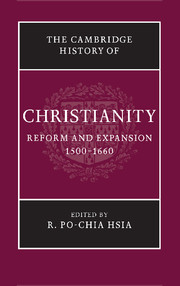Book contents
- Frontmatter
- Part I Luther and the Holy Roman Empire
- Part II The Second Reformation
- 5 Communal Reformation: Zwingli, Luther, and the South of the Holy Roman Empire
- 6 The Calvinist Reformation in Geneva
- 7 The Theology and Liturgy of Reformed Christianity
- 8 The Second Wave of Protestant Expansion
- Part III Catholic Renewal
- Part IV Resolving Confessional Conflicts
- Part V Religion, Society, and Culture
- Part VI Christianity and Other Faiths
- Bibliography
- Index
- References
8 - The Second Wave of Protestant Expansion
from Part II - The Second Reformation
Published online by Cambridge University Press: 28 March 2008
- Frontmatter
- Part I Luther and the Holy Roman Empire
- Part II The Second Reformation
- 5 Communal Reformation: Zwingli, Luther, and the South of the Holy Roman Empire
- 6 The Calvinist Reformation in Geneva
- 7 The Theology and Liturgy of Reformed Christianity
- 8 The Second Wave of Protestant Expansion
- Part III Catholic Renewal
- Part IV Resolving Confessional Conflicts
- Part V Religion, Society, and Culture
- Part VI Christianity and Other Faiths
- Bibliography
- Index
- References
Summary
Although the Reformation was a pan-European event from the start, its initial epicentre was the Germanic cultural world: the Holy Roman Empire and those Baltic and Nordic regions tied closely to it by language, trade, and patterns of university attendance. Here, as the magnificent anarchy of the early Reformation gave way to confessionalization, the centrality of Luther’s writings and persona in early evangelical propaganda, as well as the political process by which Protestant territorial churches came to be established and defended, ensured that the great majority of the new Protestant churches would be Lutheran.
Elsewhere in Europe, the Reformation’s spread and institutionalization took longer. In Hungary, it appears to have been during the 1530s and 1540s that the process of change by parish and seigneurial initiatives got underway that by the century’s end had brought the majority of the population into the Protestant camp. Henry VIII divorced the Church of England from obedience to Rome in 1534, but only during the mid-century reign of his son and successor Edward VI (r. 1547–53) did the church’s doctrines and liturgy assume a clearly Protestant cast. Between 1550 and 1566, networks of Protestant churches formed and proliferated in defiance of governmental repression in Poland, Scotland, France, and the Netherlands. Religious wars soon followed in the last three lands. The party of Reformation triumphed quickly in Scotland. It took it until the 1590s to achieve a less complete victory in the northern provinces of the Netherlands that gained their independence from Spain.
- Type
- Chapter
- Information
- The Cambridge History of Christianity , pp. 125 - 142Publisher: Cambridge University PressPrint publication year: 2007



